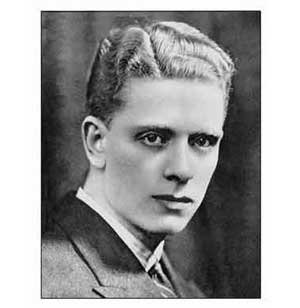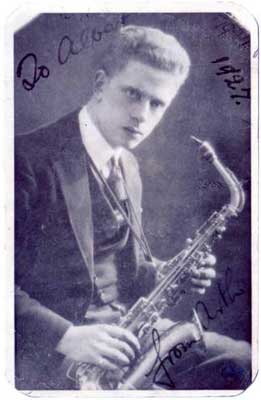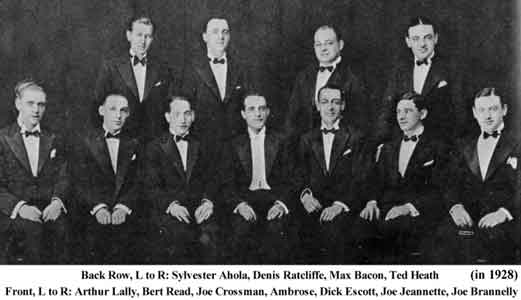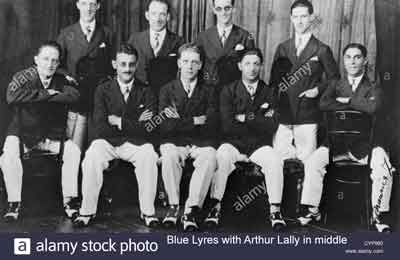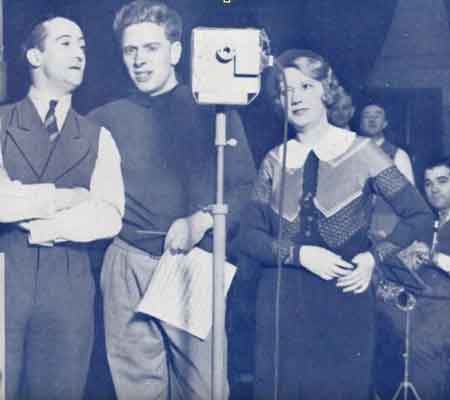ARTHUR LALLY: (December 1900. Seaforth, Liverpool - August 1940. London)
Another sadly forgotten champion of the British Dance Bands of the late 1920’s and 30’s. He oversaw the making of some of the “hottest” dance band music of the period. Arthur Lally was a band leader & arranger. He played clarinet, alto saxophone & his famous baritone saxophone playing was styled on that of Adrian Rollini. He can be found on recordings released on many record labels.
His father was an army band conductor who taught him the cornet and he was the brother of arranger Jimmy Lally. Arthur switched to trombone before his teens, and by 1914 he was proficient also on trumpet, piano, violin and clarinet. He started his professional musical career in the early 1920s, initially playing trombone in a Liverpool dance band.
TIMELINE:
- 1922: Arthur Lally moved south and played at the Hammersmith Palace and at the night club Ciro's in London
- 1926-1927: He joined the Savoy Orpheans at the Savoy Hotel
- 1927: Joined Bert Firman's band at the Devonshire Restaurant and recorded with Ronnie Munro & His Orchestra (Mimosa Dance Orchestra) and The Devonshire Restaurant Dance Band (Zonophone). During this time he was heavily in demand for recording sessions, an article in the Melody Maker claimed that he "has recorded for nearly every gramophone company in England."
- 1928-1933: He joined the Ambrose Orchestra at the Mayfair Hotel in London. Also recorded with Arcadians Dance Orchestra. He directed Ambrose’s Blue Lyres from May 1929 to March 1930.
In 1929 he organised Decca's first studio house band, which waxed many sides in the 1929-1932 period, some of the early ones being notable for hot solos from Sylvester Ahola as well as Lally himself (mainly on alto, baritone and bass sax).
He led his own orchestras, sometimes labelled as Arthur Lally's Million-Airs, The Rhythm Maniacs and as Arthur Lally & His Orchestra 1931 (Decca). He recorded extensively for the Filmophone label (1930-32) as Arthur Lally & His Band and under many pseudonyms. He also continued doing arrangements for Ambrose and many others. He was influential at Decca Records and is particularly notable for having directed Elsie Carlisle during sessions with the Rhythm Maniacs.
Lally renewed the Blue Lyres in April 1931 but in October 1932, handed them over to Peter Rush due to health issues.
- 1933 onwards: He did a lot of freelance work for many orchestras and bands including with the Rhythmic Eight of Bert Firman but he worked primarily as an arranger and was musical director at Decca Records.
The Bowlly connection:
- February 15th, 1929: Len Fillis's Entertainers
- June 1st 1932: Arthur Lally and His Orchestra 4 tracks
- June 30th 1932: Arthur Lally and His Orchestra 2 tracks
- July 23rd 1932: Arthur Lally and His Orchestra 2 tracks
- September 21st 1932: Arthur Lally and His Orchestra 2 tracks
- September 21st 1932: Arthur Lally and His Orchestra 4 tracks
Arthur Lally, cl, as, bar, dir: Max Goldberg and another, t / Tony Thorpe, tb / cl, as / cl, ts / Claude Ivy, p / Alan Ferguson, g / Spike Hughes, sb / Rudy Starita, d, vib, x / Al Bowlly, v.
Apart from music Arthur Lally had a passion for motor-cars, as well as interests in electrical engineering and wireless. He also had a full pilot's licence, and in 1940 he asked to be allowed to pilot a bomb-laden airplane to Hitler's mountain hide-out in Berchtesgaden. The request was turned down by the War Office, and sadly due to depression, he took his own life in his Richmond-upon-Thames home in August 1940.
A big thank you to Barry McCanna for corrections. There is a 9-page article on Arthur Lally in Memory Lane issue 150.
